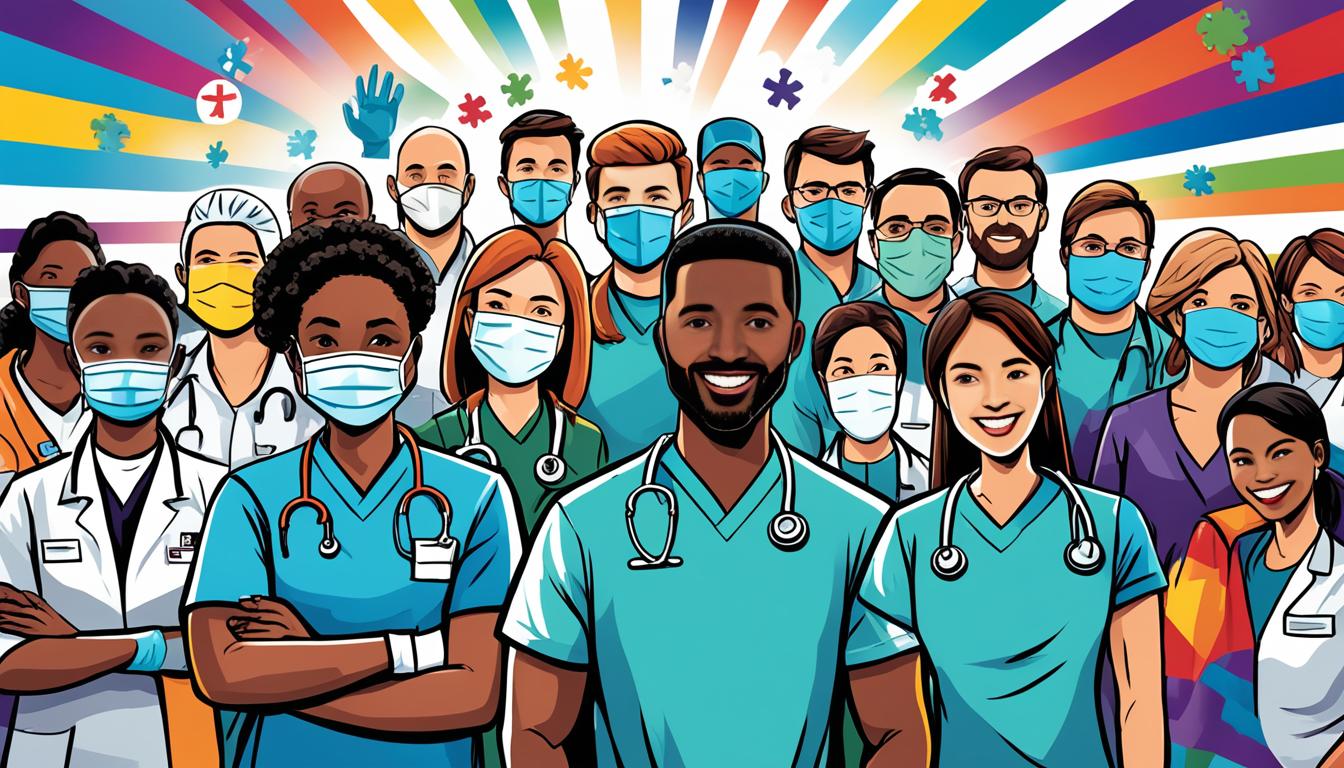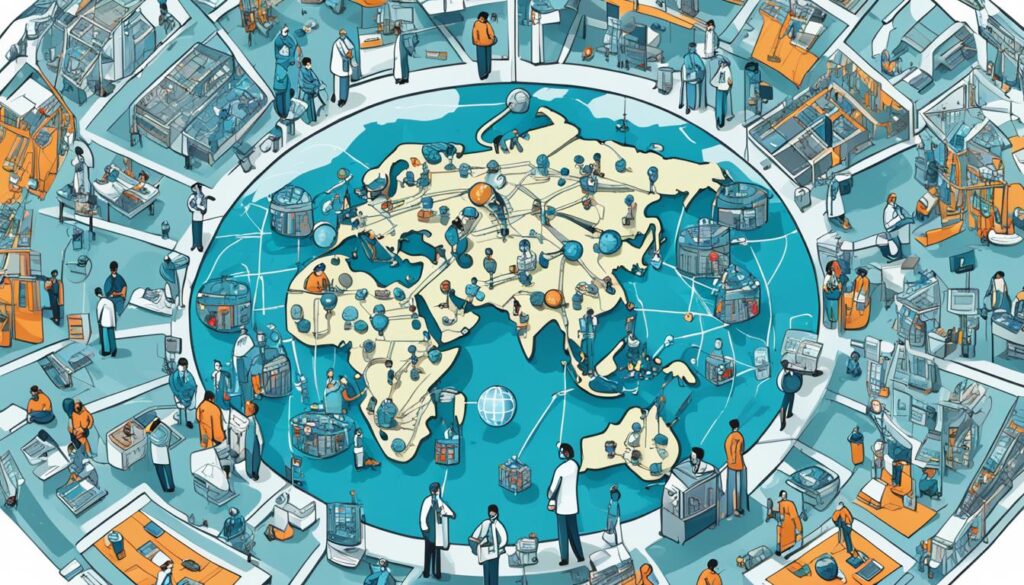The COVID-19 pandemic has thrust the world into an unprecedented global health crisis. As the virus outbreak rages on, it becomes increasingly clear that saving lives and finding healthcare solutions requires a collective effort and global cooperation. This article delves into the importance of community resilience and the positive impact it can have on pandemic response, emphasizing the need for united action in these challenging times.
Key Takeaways:
- Global cooperation is crucial in effectively combatting the COVID-19 pandemic and saving lives.
- Community resilience plays a pivotal role in the pandemic response, highlighting the importance of coming together as a team.
- Positive impact can be achieved through unified efforts to find effective healthcare solutions.
- The global health crisis necessitates a united front and a joint commitment to collective well-being.
- By working together, we can build a healthier and more resilient world for future generations.
The Three Phases of the Pandemic Crisis
The Covid-19 pandemic can be framed around three distinct phases – the Shelter-in-Place Phase, the Re-opening Business Phase, and the Post-Covid-19 Phase, each with its unique set of challenges and requirements.
During the initial Shelter-in-Place Phase, strict measures were put in place to limit the spread of the virus. Lockdowns and social distancing measures were implemented, with businesses and schools closing, and individuals staying at home to minimize contact. This phase aimed to slow down the transmission of the virus and prevent healthcare systems from becoming overwhelmed.
As the situation improved and the number of cases subsided, countries moved into the Re-opening Business Phase. Gradually, businesses began to reopen, and people cautiously resumed their daily activities. However, this phase presented its own set of challenges. Leaders had to strike a delicate balance between reopening the economy and ensuring public safety. Strict health protocols and guidelines were put in place to protect employees and customers, while also enabling businesses to operate.
Currently, we find ourselves in the Post-Covid-19 Phase, where the focus has shifted towards recovery and adapting to a new normal. While the pandemic is not over, vaccinations and advancements in treatment have brought hope for a brighter future. During this phase, leaders must navigate the ongoing challenges of rebuilding economies, addressing the long-term impacts of the crisis, and preparing for potential future outbreaks.
It is crucial for leaders to communicate transparently throughout each phase, providing clear guidelines and updates to the public. Supporting front-line workers, who have tirelessly battled the pandemic, is also essential. By navigating these phases with clarity, purpose, and an unwavering commitment to public health, companies can emerge stronger, adapt to new opportunities for growth, and contribute to post-Covid-19 recovery.
The Importance of Navigating the Phases
“Throughout the pandemic crisis, it is essential for leaders to understand the unique challenges and requirements of each phase. By addressing the specific needs of each stage and providing support to front-line workers, we can pave the way for a successful recovery and a post-Covid-19 world.”
– Dr. Sarah Thompson, Epidemiologist
A New Social Contract and Global Deal
The COVID-19 pandemic has presented us with an unprecedented opportunity to create a New Social Contract and a New Global Deal. This transformative initiative aims to build back a more equal and sustainable world, ensuring that everyone has access to equal opportunities and that the rights and freedoms of all individuals are respected. In the face of the health crisis, it has become even more crucial to address the glaring inequalities and vulnerabilities that the pandemic has laid bare.
By forging a global cooperation and a commitment to change, we can pave the way for a healthier and more resilient future. This requires a collective effort to not only address the immediate impacts of the pandemic but also to prevent future infectious disease crises. The goal is to create a world that is better equipped to respond to health emergencies and one that is resilient in the face of future challenges.
To achieve this, it is imperative to prioritize equal opportunities for all, ensuring that no one is left behind. This involves promoting inclusive policies, investing in education and skills training, and creating a conducive environment for sustainable economic growth. By empowering individuals, we can foster innovation, creativity, and productivity, ultimately leading to a more prosperous and sustainable society.
Addressing Inequalities and Vulnerabilities
The New Social Contract and Global Deal also call for a comprehensive approach to address the underlying inequalities and vulnerabilities that have been exacerbated by the health crisis. This includes addressing issues such as poverty, gender inequality, and lack of access to basic services. By focusing on social justice and equity, we can build a society that places the well-being of all its citizens at the forefront.
“The COVID-19 pandemic has highlighted the urgent need for a New Social Contract and Global Deal. It is an invitation for humanity to come together and create a fairer, more inclusive, and sustainable world for all.” – António Guterres, Secretary-General of the United Nations
Key Principles of the New Social Contract and Global Deal
| Principle | Description |
|---|---|
| Equal Opportunities | Creating an environment that ensures equal opportunities for all individuals, regardless of their backgrounds or circumstances. |
| Sustainability | Building a sustainable world that prioritizes the well-being of present and future generations. |
| Respect for Rights and Freedoms | Upholding and respecting the rights and freedoms of all individuals, promoting inclusivity and social justice. |
| Preventing Future Crises | Taking proactive measures to prevent future infectious diseases crises and building resilient health systems. |
By embracing the principles of the New Social Contract and Global Deal, we can chart a path towards a more equitable and sustainable future. It is a journey that requires cooperation, collaboration, and a shared commitment to positive change. Together, we can create a world that thrives on equal opportunities and paves the way for a better tomorrow.
The Role of the United Nations
The United Nations has played an integral role in responding to the COVID-19 crisis by actively supporting states and communities throughout the global pandemic. Through their UN Comprehensive Response to COVID-19, they have provided essential resources and assistance to address the health, socio-economic, humanitarian, and human rights impacts of the pandemic.
The United Nations has made significant contributions in multiple areas:
- COVID-19 Response and Global Support: The UN has facilitated coordination among member states, international organizations, and civil society to implement effective response strategies. Their collaboration has resulted in the sharing of best practices, resources, and expertise to combat COVID-19 globally.
- Policy Recommendations: The United Nations has been at the forefront of formulating policy recommendations based on extensive research and analysis. These recommendations have guided governments and stakeholders in implementing measures to control the spread of the virus, provide adequate healthcare resources, and mitigate the socio-economic consequences of the pandemic.
- Human Rights Impacts: Recognizing the profound impact of the pandemic on human rights, the United Nations has prioritized the protection of fundamental rights and freedoms amid the crisis. They emphasize the need for a rights-based approach in the response and recovery efforts, aiming to ensure that vulnerable populations are not disproportionately affected.
The United Nations has also highlighted the importance of a New Social Contract and Global Deal to address not only the immediate challenges posed by the COVID-19 pandemic but also future shocks such as climate change. This forward-thinking approach seeks to address systemic inequalities and create a more resilient and equitable world.
The commitment of the United Nations to global cooperation and policy guidance has been instrumental in navigating the complexities of the COVID-19 crisis and laying the groundwork for a more prepared and inclusive future.
United Nations Contributions to COVID-19 Response
| Contributions | Description |
|---|---|
| Coordination and Collaboration | Facilitated global coordination among member states and international organizations to implement effective response strategies. |
| Policy Recommendations | Contributed to formulating evidence-based policy recommendations to guide governments and stakeholders in their response efforts. |
| Protection of Human Rights | Emphasized the importance of protecting human rights amidst the pandemic and advocated for a rights-based approach in response and recovery efforts. |
| New Social Contract and Global Deal | Advocated for a new social contract and global deal to address systemic inequalities and build a more resilient and equitable future. |
Strengthening Global Health Architecture
In a historic decision, the World Health Assembly has agreed to launch a global process to draft and negotiate a convention, agreement, or international instrument under the Constitution of the World Health Organization (WHO) to strengthen pandemic prevention, preparedness, and response. This move aims to address the flaws in the global system that have been exposed by the Covid-19 pandemic and ensure the well-being of all people.
An intergovernmental negotiating body will be established to lead this process, with the goal of adopting the instrument by the 77th World Health Assembly in 2024.
The strengthening of the global health architecture is essential in order to effectively combat future pandemics and protect global health security. The WHO Constitution serves as a guiding framework for this process, providing a solid foundation to build upon.
Through the establishment of an intergovernmental negotiating body, representatives from different countries will come together to discuss and negotiate the terms of the convention or international instrument. This inclusive and collaborative approach ensures that the voices and perspectives of all nations are taken into consideration.
The negotiations will focus on key areas such as pandemic prevention, preparedness, and response. This will include discussions on improving early warning systems, strengthening healthcare infrastructure, ensuring equitable access to vaccines and treatments, and enhancing international cooperation in sharing information and resources.
The adoption of this instrument will mark a significant milestone in global health governance. It will demonstrate a collective commitment to strengthening the global response to pandemics and ensuring the well-being of all individuals, regardless of nationality or socioeconomic status.
“The launch of this global process reflects the urgent need to learn from the experiences of the Covid-19 pandemic and build a more resilient and effective global health architecture. By working together, we can overcome the challenges posed by infectious diseases and protect the health and well-being of people worldwide.” – Dr. Tedros Adhanom Ghebreyesus, Director-General of the WHO
The intergovernmental negotiating body will play a crucial role in shaping the future of global health governance. Their discussions and deliberations will help develop an instrument that addresses the current gaps and weaknesses in the global system, while also considering the evolving nature of pandemics and infectious diseases.
By strengthening the global health architecture, we can better prepare for and respond to future health crises, protecting lives and minimizing the social and economic impact of pandemics.
The Way Forward: Saving Lives and Building Resilience
Moving forward, it is crucial to prioritize saving lives and building resilience in our communities and healthcare systems. The COVID-19 pandemic has shown us the vulnerabilities and gaps in our healthcare infrastructure, and it is essential that we take immediate action to address them.
Global solidarity is key in overcoming this crisis. By working together as a global community, we can effectively combat the spread of infectious diseases, ensure equitable access to healthcare for all, and save lives. This requires a collaborative approach, where countries share resources, knowledge, and expertise to strengthen healthcare systems.
Equitable access to healthcare and vaccines is a fundamental aspect of building resilience. It is necessary to bridge the gap between developed and developing countries, ensuring that everyone has access to quality healthcare regardless of their socioeconomic status. This will not only save lives but also help in reducing the impact of future health crises.
Global Solidarity in Action:
“We must strengthen global partnerships and work together to ensure that every country has access to the necessary resources to protect their population and prevent further outbreaks.” – Dr. Tedros Adhanom Ghebreyesus, Director-General of the World Health Organization
Achieving these goals requires financial investment, strategic planning, and collaboration between governments, international organizations, and healthcare providers. It is crucial to prioritize healthcare infrastructure development, training healthcare professionals, and implementing effective public health measures to prevent and respond to future outbreaks.
With a focus on saving lives and building resilience, we can emerge from this pandemic stronger and better prepared for future challenges. The COVID-19 crisis has highlighted the importance of investing in robust and adaptable healthcare systems that can effectively respond to any health emergency. By working together and addressing the inequalities and gaps in our healthcare systems, we can create a brighter and healthier future.
Inspiring Stories of Community Resilience
The Covid-19 pandemic has brought out inspiring stories of community resilience. Despite the devastating impact of the pandemic, communities around the world have come together to support and uplift one another in times of crisis. These inspiring stories highlight the power of human connection and the determination to overcome adversity.
One such story comes from the favelas of Brazil, where ballet groups have been providing social support to vulnerable communities. With limited resources and facing the challenges of poverty, these ballet groups have found creative ways to inspire and uplift their community members. Through dance and artistic expression, they have created a sense of hope and unity, reminding people of their strength and resilience.
In Uzbekistan, radio journalists have played a critical role in dispelling falsehoods and providing accurate information about the pandemic. Armed with the power of words, they have become beacons of truth in a time of uncertainty. By ensuring that accurate information reaches the masses, these journalists have helped to save lives and protect their community from the spread of misinformation.
These stories emphasize the importance of social support and solidarity during times of crisis. They showcase the resilience of individuals and communities, demonstrating that even in the face of adversity, we have the power to make a difference.
“The pandemic has not only highlighted our vulnerabilities but also our capacity for compassion and solidarity. These inspiring stories remind us that together, we can overcome any challenge and build a stronger future for all.” – Dr. Maria Lopez, Community Resilience Expert
Community Support Initiatives
Community organizations and individuals have stepped up to support those in need during these challenging times. Here are some inspiring examples:
- Food banks and local organizations providing meals and necessities to families facing economic hardships
- Volunteers organizing virtual events and activities to combat social isolation
- Healthcare professionals offering free telehealth consultations to ensure access to medical advice
- Tech-savvy individuals assisting elderly community members with online platforms and digital tools
Impact on Healthcare Access and Poverty
The pandemic has highlighted the existing disparities in healthcare access and poverty. The most vulnerable populations have been disproportionately affected, facing challenges in accessing quality healthcare and essential resources. It is crucial that we work towards equitable healthcare systems and address the root causes of poverty to ensure a more resilient and inclusive society.
| Impact of the Pandemic | Solutions and Initiatives |
|---|---|
| Increased strain on healthcare systems | Investing in healthcare infrastructure and resources |
| Loss of income and livelihoods | Implementing social safety nets and financial support programs |
| Limited access to education | Promoting digital learning initiatives and providing resources for remote education |
| Food insecurity | Expanding food assistance programs and supporting local agriculture |
The Role of Leaders in Crisis Management
Effective crisis management requires leaders to prioritize transparent communication, foster authentic connections, and support their teams’ growth and meaning. In the face of a pandemic, leaders must go beyond ensuring health and safety and address higher-level needs of their employees. This involves connecting the company’s purpose to personal meaning and finding new opportunities for growth amid the crisis.
“Transparent communication, authentic connections, and meaningful growth are crucial aspects of crisis management that leaders must prioritize.”
The Importance of Transparent Communication
During times of crisis, transparent communication is key to keeping employees informed, reducing uncertainty, and maintaining trust within the organization. Leaders should provide regular updates on the situation, address concerns openly, and be honest about the challenges faced by the company. By fostering a culture of transparent communication, leaders can build trust and ensure that all employees feel informed and supported.
Fostering Authentic Connections
Authentic connections with employees are essential during times of crisis. Leaders should actively listen to their concerns, provide emotional support, and encourage open dialogue. By showing empathy and understanding, leaders can create a supportive environment and strengthen the bond between the organization and its employees. This sense of connection can help boost morale, resilience, and overall well-being within the company.
Supporting Growth and Meaning
Effective crisis management goes beyond immediate response and addresses the long-term needs of employees. Leaders should help their teams find meaning in their work and support their growth and development. This can be done by aligning the company’s purpose with employees’ personal values, providing learning opportunities, and empowering individuals to contribute meaningfully to the organization’s goals. By investing in their employees’ growth, leaders can foster resilience and loyalty even during challenging times.
Example Table: Crisis Management Strategies
| Strategy | Description |
|---|---|
| Effective Communication Plan | Develop and implement a clear communication strategy, including regular updates, channels for feedback, and transparent information sharing. |
| Employee Support Programs | Establish programs to provide emotional and mental health support to employees, such as counseling services, wellness initiatives, and flexible work arrangements. |
| Leadership Development | Invest in leadership development programs to equip leaders with the necessary skills and qualities to navigate crises and support their teams effectively. |
| Continued Learning Opportunities | Provide employees with opportunities for ongoing learning and skill development, ensuring they are equipped to adapt to changing circumstances and contribute to the company’s growth. |
Addressing Inequities and Vulnerabilities
The Covid-19 pandemic has starkly revealed and exacerbated inequities and vulnerabilities within our society. This global health crisis has exposed the disparities in healthcare access and the social injustices faced by marginalized communities. To foster a more equitable and resilient world, it is imperative that we address these longstanding inequities and vulnerabilities.
“Inequity arises from societal disparities that systematically put certain individuals or populations at a disadvantage, making them more susceptible to the negative impacts of a crisis like the Covid-19 pandemic.” – World Health Organization
The Impact of Inequities and Vulnerabilities
- Unequal access to healthcare: Inequities in healthcare access have left vulnerable populations without the necessary resources and support to combat the virus effectively.
- Socioeconomic disparities: Vulnerable communities, such as low-income individuals and racial minorities, have been disproportionately affected by job loss, economic downturn, and limited social safety nets.
- Mental health challenges: The pandemic has exacerbated pre-existing mental health issues and created new ones, especially among those facing socioeconomic disparities and marginalized communities.
- Education disparity: Students from disadvantaged backgrounds may lack the necessary resources and support for remote learning, widening the education gap further.
Tackling these inequities and vulnerabilities requires a collective effort driven by global solidarity and a commitment to social justice. By recognizing and addressing the flaws in the global system, we can work towards preventing future pandemics and building a more resilient world.
Promoting Global Solidarity and Healthcare Access
“Healthcare is a fundamental human right, and everyone should have equitable access to quality healthcare services.” – World Health Organization
To promote global solidarity and equitable healthcare access, it is essential to:
- Invest in healthcare infrastructure: Governments and international organizations must prioritize the development and strengthening of healthcare systems, particularly in underprivileged areas.
- Ensure equitable distribution of vaccines and resources: Efforts should be made to ensure fair and equal access to Covid-19 vaccines and healthcare resources, regardless of geographical location or socioeconomic status.
- Address social determinants of health: Inequities in healthcare are often rooted in social determinants of health, such as poverty, education, and discrimination. Policies and initiatives should aim to address these underlying factors.
- Promote health literacy and education: Empowering individuals with accurate health information and promoting health literacy can help reduce disparities in healthcare access and outcomes.
The image above highlights the vulnerabilities faced by marginalized communities during the pandemic, underscoring the importance of addressing inequities for a more inclusive and resilient world.
| Key Actions | Potential Impact |
|---|---|
| Investing in healthcare infrastructure | Improved access to quality healthcare for marginalized communities, strengthening healthcare systems |
| Equitable distribution of vaccines and resources | Reduced disparities in Covid-19 outcomes, increased global health security |
| Addressing social determinants of health | Improved overall health outcomes, decreased healthcare disparities |
| Promoting health literacy and education | Empowered individuals making informed healthcare decisions, reduced health disparities |
By taking these key actions and embracing a commitment to social justice, we can work towards creating a more equitable world, where everyone has access to quality healthcare and the opportunity to thrive.
Conclusion
In conclusion, the ongoing Covid-19 pandemic has underscored the critical importance of global cooperation and community resilience in saving lives and finding effective healthcare solutions. As the world confronted this unprecedented crisis, it became evident that no country or community could combat the pandemic alone. A united global effort was required to minimize the impact of the virus and protect the well-being of individuals across the globe.
Through collective action and collaboration, we witnessed remarkable achievements in healthcare solutions, the sharing of knowledge and expertise, and the development of vaccines in record time. The pandemic served as a catalyst for innovative approaches and the strengthening of healthcare systems worldwide. Communities demonstrated incredible resilience, coming together to support one another, prioritize healthcare access, and find creative solutions to mitigate the challenges imposed by the pandemic.
It is imperative that we continue to build on these lessons learned and address the flaws in the global system that the pandemic has exposed. By fostering global cooperation, investing in healthcare infrastructure, and prioritizing community resilience, we can create a stronger, healthier, and more equitable world. This requires sustained commitment and the recognition that the actions we take today will shape the future for generations to come.
As we move forward, it is essential to remain vigilant, embrace scientific advancements, and maintain a spirit of solidarity. By capitalizing on the momentum generated during this challenging time, we have the opportunity to not only overcome the current pandemic but also lay the groundwork for a global system that is better prepared to face future health crises. Together, we can save lives, promote community resilience, and ensure a brighter and healthier future for all.

As the founder of Friends Game Night, Ryan channels his enthusiasm for gaming into a platform that celebrates the magic of gathering friends around the digital or physical tabletop. Through his website, Ryan shares insightful articles, reviews, and recommendations, aiming to inspire others to create their own memorable gaming moments.












